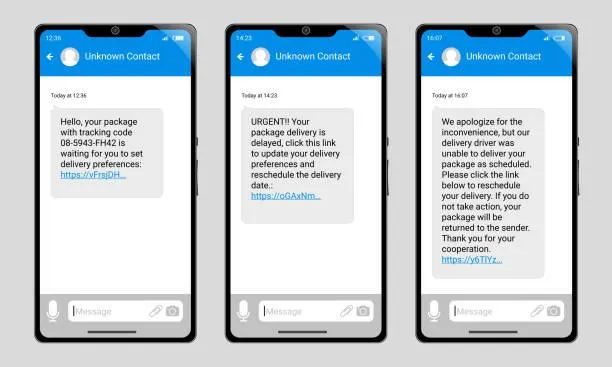
Beware: Holiday Text Scams
TL;DR (AKA the short version)
Holiday text scams are on the rise, with scammers pretending to be delivery services, retailers, or charities to steal personal info or money. Look out for unsolicited messages, urgent threats, too-good-to-be-true offers, unfamiliar links, and requests for personal details. Scammers prey upon the familiarity of these kinds of communication to get you to click out of habit. Protect yourself by not clicking on suspicious links, verifying sources, using two-factor authentication, and reporting scams. If you fall for a scam, change your passwords, monitor your accounts, and report it. Stay cautious and safeguard your personal information this holiday season!
Beware of Holiday Text Scams: How to Protect Yourself This Season
As the holiday season approaches, it’s not just the festive cheer and family gatherings we need to prepare for. Scammers are also ramping up their efforts, trying to take advantage of the increased online shopping and holiday-related communications. One of the most prevalent methods they use is text message scams. Scammers know that we’re all used to getting these kinds of messages, so they prey upon that familiarity to get you to click a link and input your information without thinking about it. These deceptive messages are designed to trick recipients into sharing personal information, downloading harmful software, or making unnecessary payments. Here’s everything you need to know about holiday text scams and how to protect yourself.
What Are Holiday Text Scams?
Holiday text scams are fraudulent messages sent by scammers pretending to be trustworthy sources like retailers, shipping companies, or even loved ones. The goal of these scams is to either steal your personal information, infect your device with malware, or trick you into sending money or gift cards.
These messages often appear out of the blue and may use tactics that seem urgent or enticing. Some examples of holiday text scams include:
Fake Package Delivery Notices: You receive a text claiming to be from a well-known delivery service (like UPS or FedEx) saying there’s an issue with your package or that you need to confirm delivery details.
Discount or Gift Card Offers: Scammers may text you offering deep discounts, free gift cards, or exclusive holiday deals that seem too good to be true.
Charity Scams: You may get a text from a fake charity requesting donations for a holiday cause, making you feel guilty and pressured to contribute.
Phishing Scams: A text might claim your account has been compromised, asking you to verify your details by clicking on a link. The link could lead to a fake website designed to steal your login credentials.
Common Red Flags to Watch For
Knowing the warning signs of a scam is crucial to protecting yourself. Here are some key red flags that a text might be a scam:
Unexpected or Unsolicited Messages: If you receive a text from an unknown number or company that you haven’t interacted with recently, be suspicious. Legitimate companies usually don’t reach out via text unless you’ve opted into communications
Urgency or Threats: Scammers often create a sense of urgency, telling you that your account has been compromised, a delivery is stuck, or you need to act fast to claim an offer. Always pause and think before clicking any link or taking action.
Too Good to Be True Offers: Holiday scams often involve offers that sound too good to be true, like incredible discounts or free gifts. If it seems too good to be true, it probably is.
Unfamiliar Links or Phone Numbers: If the text includes a link or phone number that seems off or unfamiliar, don’t click it. Scammers often use slightly altered URLs to make them look legitimate.
Requests for Personal Information or Money: Be wary of any text that asks for personal information, payment, or gift cards. No legitimate company or charity would ask for sensitive details over text.
How to Protect Yourself From Holiday Text Scams
While scams are becoming more sophisticated, there are several ways you can safeguard yourself during the holidays:
Don’t Click on Unknown Links: If you receive a suspicious text with a link, don’t click it. Instead, visit the website directly by typing in the URL yourself or use the official app for the service.
Verify the Source: If the message claims to be from a retailer, shipping service, or charity, verify it through official channels. Call the customer service number from their website or check your order status directly.
Enable Two-Factor Authentication (2FA): Protect your accounts with two-factor authentication wherever possible. Even if a scammer gets your login details, they won’t be able to access your account without the second verification step.
Block and Report: If you receive a scam text, block the number and report it to your mobile carrier. You can also forward suspicious messages to your carrier’s scam reporting number (e.g., 7726 for most U.S. carriers).
Install Anti-Virus Software: Ensure your phone has updated anti-virus or anti-malware software to help catch and block malicious apps or links.
Be Cautious with Holiday Donations: If you get a text asking for donations, don’t respond directly. Research the charity first and donate via their official website.
Check Your Statements: Keep an eye on your bank and credit card statements during the holidays for any unexpected charges. Early detection is key if you fall victim to a scam.
What to Do If You’ve Fallen for a Scam
If you’ve already clicked on a suspicious link or provided sensitive information, here are the first steps to take:
Change Your Passwords: Immediately change the passwords for any accounts that may have been compromised. If you use the same password for multiple accounts, change those as well.
Report the Scam: Report the scam to your mobile carrier, local authorities, and relevant organizations like the Federal Trade Commission (FTC) in the U.S.
Monitor Your Financial Accounts: Watch your credit card and bank accounts for unauthorized transactions. If you notice anything suspicious, contact your bank or credit card company immediately.
Use Fraud Protection: Consider using credit monitoring services or placing a fraud alert on your credit report to protect against identity theft.
Final Thoughts
Holiday text scams are a growing concern as scammers capitalize on the hustle and bustle of the season. By staying vigilant, recognizing red flags, and following best practices for cybersecurity, you can enjoy the holidays without falling victim to these deceptive tactics. Always prioritize caution over convenience—your peace of mind is worth it!
Happy holidays, and stay safe out there!


